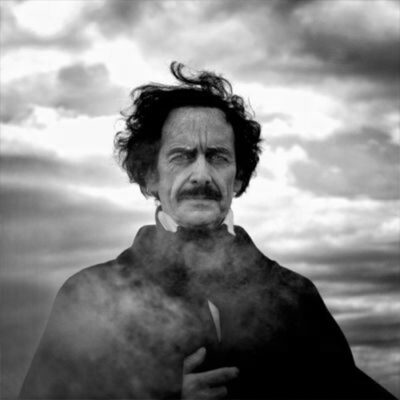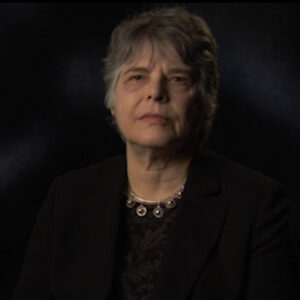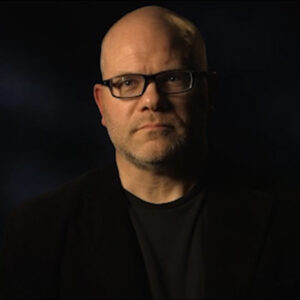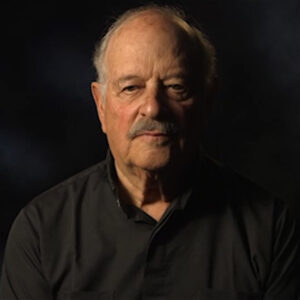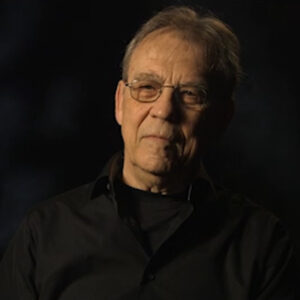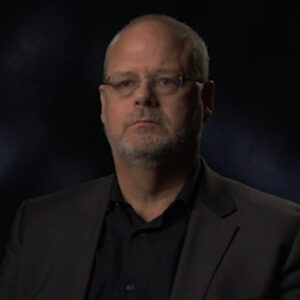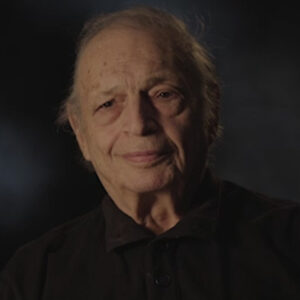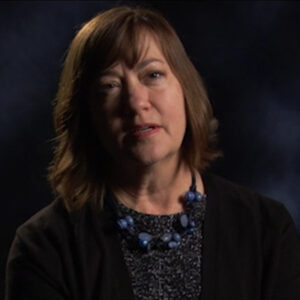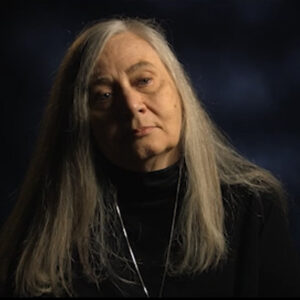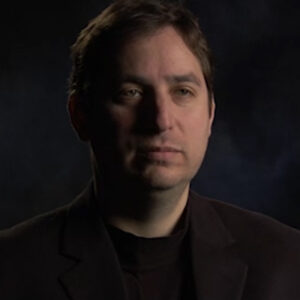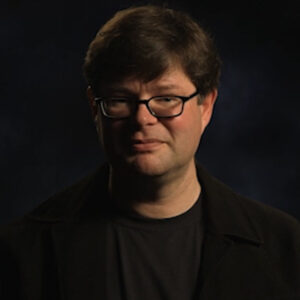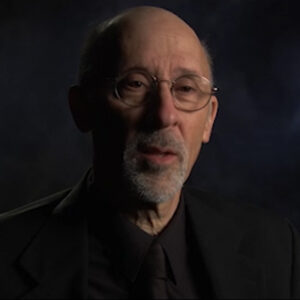Speaker So what was the impact of the death of his mother, Edgar Allan Poe?
Speaker I think the death of Poe’s mother and 18. Oh, know.
Speaker I know. It was 18 11. Sorry. Start over, OK.
Speaker The impact of his mother’s death in 18 of nine, I think had a lasting influence on Poe’s psyche. He grew up as an orphan, never knew his father. And I think that really left him with a lasting residual sense of sort of his fragility, his vulnerability in the world. He was adopted, in a sense, by the Allens, but of course, they never formally adopted him. And I think they took the trouble to remind him, or at least John Allen did, that he was always on a kind of provisional basis with them. And the rocky relationship between Poe and John Allen persisted over the years and I think reminded him of the way that he was from the very beginning of his life, really without a parent to rely on.
Speaker Thank you.
Speaker So you start to see the end of an interest or an almost obsession with death and adolescent anger with Brown, the death of Jane Standard, and how can you talk about that and how that fits in with the larger culture of death?
Speaker Poes relationship to change standard and to the many other women in his life who eventually died forms an integral pattern that, of course, is related to the core of his work, to his obsession with the death of a beautiful woman in poetry. But I think in a larger sense, it helps us to connect Poe to American culture at that time and to the funeral practices that were pervasive in the early 19th century. And it’s important to remember that all of this goes back to the 18th century and to the beginnings of romanticism. And there’s a very powerful theme or strain and romanticism toward melancholy. Gray’s elegy, written in a country churchyard, became a kind of classic. It was still popular in early 19th century America, and I think it helped to epitomize a culture that was fascinated with death and with the fetishizing of the moment of death, the dying of an individual and then the funeral practices that surrounded it. This was a great age of funereal sculpture and momentos, an age where people very typically would take the hair of the deceased and weave it into a small knot and then create jewelry of some sort that would be worn as a reminder of the dead. And the death of George Washington was sort of the high point of a kind of frenzy of the celebration of death, as well as the celebration of the life of George Washington. And all of that carries over into Poe’s age and the preoccupation with all aspects of funeral practices. Embalming comes into existence, I think, in the last decade of Poe’s life, really. But certainly the rural funeral movement, the rural cemetery movement was very pronounced in the 1930s. And that, of course, capitalized on the idea of visiting the grave and meditating there. And that was very much a part of Poe’s culture and a part of his own life. It’s at the heart of Uloom, and it was certainly a practice that that Poe followed himself.
Speaker And that’s great. Thank you. Yeah. Yeah, it it’s really interesting. I mean, we forget that.
Speaker But the attitude sorry if that’s too much information, you know, just it’s gonna we will. Well yeah. We’ll pick the best I can do tomorrow, you know. Well that’s OK. It’s better to get my book.
Speaker Um, could you talk a little bit about premature burial and pose. Oh sure. You know, why did he get so latched on to that? And how does that how much of it was in the culture in general and how much of it does pose a bit of obsession?
Speaker I’m glad you asked because I actually published a piece on premature burial back in the 1970s. Sure.
Speaker Premature burial was a real problem in American culture. As odd, as bizarre as that seems, one of the things we forget is that during periods of epidemics and there were several during post lifetime, the most important being the 1832 cholera epidemic in Baltimore, there were lots of scenes of public interments taking place very hastily without proper medical examination. And there were many, many instances of people actually being buried before they were dead. DPO collected these ideas. He, I think, had a kind of private file. He certainly read a lot of pieces in magazines that purported to document cases of living internment. And so by the time he writes his own story, the premature burial in 1844, this is a topic that he has brooded on for a long time.
Speaker It’s a surprising fact to learn that about the time that Poe was publishing that tale, someone had actually invented what was called the life preserving coffin, which was equipped with a rope and a bell that was attached to the finger of the deceased. And then the bell was over the lid of the coffin and supposedly gave the buried person an opportunity to summon help if, in fact, the worst had happened to you.
Speaker The.
Speaker Let’s skip over the University of Virginia, all right. OK. Yes, I think it’s really OK.
Speaker Some literary messenger and Thomas White, especially after their debate over the story Veronique’s. Can you talk about what you know, what was Poe saying to White? What was why?
Speaker What was the culture going to short post story? Bérénice was one of the first that he published in the Southern Literary Messenger. And I think after the story appeared, he heard from White that there was some discontent or unhappiness. Perhaps there were some readers of the Southern Literary Messenger who protested to White and he was passing this on, who felt he needed to defend this because Barrenness represented exactly the kind of story he wanted to write. So he wrote a letter to White, which is he wasn’t he wasn’t yet living in Richmond. And he explained to White that it was very important for a writer to be read if you wanted to thrive and persist as a literary figure in American culture. And so he apologized if Veronese had pushed matters to the very verge of bad taste. But that’s just the way it was planned to operate on that sort of borderline between the presentable and the unpresentable. And I think he recognized that there was something valuable about that that people responded to.
Speaker He was pushing the envelope in a very powerful way and barrenness the story where the narrator pulls the teeth from the woman he has fallen in love with gives us a kind of shocking instance of Poe’s fascination with the sensational and the forget.
Speaker I ask another question that I love. So so what was he was putting his finger on? What was he what was he sensing in the public that other writers hadn’t quite gotten to think?
Speaker There were a number of other writers at that time who were already exploiting the sensational and certainly as early as Charles Brocton Brown. There are elements of sensation that are coming into American literature. Post contemporary William Gilmore Simms was writing somewhat in the vein of sensation. But Poe, I think, was the first to really capitalize on this. He was a great reader of Blackwood’s magazine. And of course, later on he would write a famous piece called How to Write a Blackwood article that explained exactly how you exploit sensations in order to dramatize situations. Shocking moments where characters are put in the most extreme predicaments and one is literally face to face with annihilation. Great, thank you, Arthur Gordon Pym.
Speaker You know what, this is a reflection of culture.
Speaker What was Poe trying to do and how successful was the question of Arthur Gordon Pym and its relationship to poker as a really intriguing one? And I think it began in a very real sense as an attempt to exploit contemporary popular interest in South Seas exploration. The Southern Literary Messenger had already run an article in which the idea was being proposed to Congress by Jeremiah Reynolds of the South Seas expedition that would help place the United States in the forefront of global discovery and to create new markets and new opportunities. In a commercial sense, Poe recognized this as a great topic that the public would be interested in. And he began at the end of 1836 to write a narrative that I think he already understood was going to culminate in the South Seas.
Speaker And it’s a it’s a piece that really wraps up in its final novelistic form. It’s a piece that summarizes, in a way, all of the shocking themes and ideas that Poe had built into his short tales up until that time.
Speaker But it was a narrative that was directed at the public fascination with geographical exploration, scientific discovery, and also the notion of colonizing and exploiting the economic opportunities of other parts of the world.
Speaker How did it reflect Poe’s own personal issues, if at all?
Speaker There’s a very important personal connection, I think in Arthur Gordon Pym. We can see in the opening chapters some hints, reflections of Poe’s own autobiography, his own past. Arthur Gordon Pym comes from Edgartown and there are references to figures who can be identified or linked with people in his own past. The notion of a male running away from his family was, of course, an important part of his own life story. His break with John Allen in 1927 1827 pardon me his break with John Allen in 1827 precipitated his life in Boston and his experience that eventually led him to a literary career. But in the 18th thirties, when Poe is writing the narrative of Arthur Gordon Pym, I think one thing that was very much on Poe’s mind was the explosiveness of the slavery debate that was going on in the United States at that time. Poe was living in Baltimore in 1831 during the Nat Turner Rebellion, which took place, of course, in Southampton County, Virginia. But the publication of The Confessions of Nat Turner, the first publication was in Baltimore. Poe was there when that came out. And I think because that event caused the panic not only in Virginia but throughout the South, I think Poe recognized in that the tremendous danger represented by this institution of slavery. And of course, all of that gets compressed into the powerful conclusion of Arthur Gordon Pym.
Speaker How does that typify people if it does impose approach toward social issues, political issues that I mean, it’s fairly oblique, you don’t know it is oblique and who was clearly using?
Speaker What he often did was a strategy of displacement, so many of his European tales.
Speaker Can I ask you to start over again? You say in his references to slavery or is OK, including something that puts in the context. Sure.
Speaker In those references to slavery and Arthur Gordon Pym, he was displacing the immediate problem of the slave debate in Virginia in the 1930s and the general anxiety that was provoked by the Nat Turner rebellion of 1831. This strategy of displacement, the idea of shifting an American fear or terror to a foreign or remote place was a strategy that Poe used throughout the 30s and 40s. So although the narrative of Arthur Gordon Pym culminates in the remote South Seas, literally in the Antarctic regions, Po was shifting his territory, his narrative to the furthest south he could imagine. But the reference in Pym to rocks that look like chorded bales of cotton was a signal to all readers that this narrative, although it seems to be set in a very distant place, touches subjects that are very close to home.
Speaker It’s great. Thank you so much. That’s enough, what do you think, Floyd? Are we OK with that?
Speaker Yes, and fortunately, Jerry has a nice, strong voice. Yes. OK, how are you doing? I’m doing fine. Let me take a little powder.
Speaker We’re just going to put it I’m I’m starting to claim the fact that going against just against in terms of making a living, making a career, how hard or easy would it be Po’s life as a magazine?
Speaker This represented one of the great challenges of his career, his existence. He was faced with the problem that he was poor, he had no capital. And so he was compelled to work for to write for people basically for whom he had not a huge amount of respect.
Speaker Thomas W. White, the owner and publisher of the Southern Literary Messenger, I think was someone who frankly understood his limits in the magazine world and turned a lot of work over to Poe.
Speaker But when he got into arguments with Poe and overruled, Poe felt as if he was dealing with a nincompoop. I think he had a different kind of relationship with William Burton at Burton’s gentlemen’s magazine. Burton certainly was more of a literary man. He was an actor, theater owner, and he was someone who was very cunning about the magazine market. He was a British expatriate who decided he was going to create an American magazine. So he understood very shrewdly that there was a lot of nationalistic chest beating going on in the 30s. And he wanted his magazine to capitalize on that notion of presenting something for an American public. This is an American review.
Speaker And yet his relationship to Poe, I think, was, if anything, more explosive than the relationship that Poe had with Thomas White. The ending with William Burton produced one of the really famous letters in Poe correspondence, his letter in late May of a 1840 where he basically is telling William Burton that he has cheated him, he’s short changed him, and he’s not going to put up with it anymore. And I think there is in that a lot of classic Poe and anger and indignation. And that epitomizes his predicament as a magazine, as sort of having no capital, no ability to create his own magazine, and being forced to work for people whose intelligence he thought was very inferior at times. And his relationship to Graham, George Graham at Graham’s magazine was perhaps a little happier. Graham tended to be less fat.
Speaker We’ll start with Graham.
Speaker His relationship to George Graham, I think was less problematic. Graham was not so much of a micromanager as Burton and White had been. Poe had a little more latitude, but he was part of a bigger staff. So he did not have the kind of direct input and largely effective control over what was going into the magazine that he did with a Southern Literary Messenger with Graham.
Speaker He was contributing some of his famous tales and reviews, and Graham was actually quite a supporter and admirer of Poe and was at one point even willing to front the money for Poe to start his own magazine. That plan never worked out. And of course, that’s one of the great sagas of those entire career that his dream of a monthly magazine, he called it the pen and then the stylist’s the magazine that was going to be the great quality magazine in American literary culture. Never happened.
Speaker Just so sad. Yeah, it is his his mission to eliminate American literature in the course of doing that.
Speaker Being an incredibly harsh critic, could you talk about that? I mean, did he really see himself as on this on this crusade?
Speaker I think so. We see in his work with the Southern Literary Messenger, a very interesting exercise called Autography, where Poe begins to collect autographs of well-known literary figures. He presents these in the form of a joke, a literary joke. And the letters to these literary figures are clearly phonies. They’re dummy letters to elicit an autograph. But what Poe is up to there, I think, is an early version of what he later accomplishes in Graham’s magazine, which is a much more extensive survey of the literati of the United States. In a curious way, I think Poe felt that he was uniquely qualified to identify, to designate the writers of the United States and to help articulate an idea of this literary culture that existed over and beyond all of the regional urban cliques and coteries that existed in America at the time, who was one of the very first to think about American literature as a kind of totality, a network, a whole spectrum of pursuits and publications. And he wanted to convey an idea of that. And actually, at one point in his career, actually dreamed of writing the first literary history of American literature.
Speaker That’s great. Could you talk a little more about it from even a wider vantage point and maybe remind remind us that America was only 50 years old? Right. I’m 50, 60 years old. That we didn’t have a cultural tradition. Absolutely a literary tradition. And therefore, he was stepping into open space. Yeah.
Speaker One of the recurrent themes in those reviews and critical pieces is his sense of indignation at the power of British criticism and British opinion over American culture. He, even in an 1845 review, called for a Declaration of Independence or even a declaration of war against British influence and authority. Poe was adamant about the need for American independence intellectually. And of course, this is a theme that was being touted elsewhere. There are strong echoes of Emersons famous American scholar address that we pick up here. I’m not sure that Poe was even aware of that American scholar speech, but this was even for Emerson. He was repeating an idea that was very, very widely circulated in American culture, that it was time for America to discover its own identity. And that was going to be done. Many people felt, by emphasizing American themes, emphasizing the materials of American history, create myths of the nation that would help to articulate this sense of what exactly this new United States of America amounted to. Power was adamant about the need for American literary independence. But here’s where he broke with most of his contemporaries. He absolutely rejected the idea that the way to create an American literature is to build a lot of tales and novels around the frontier, around the American Revolution, around scenes of American greatness. Poe felt that that was the weakest form of provincialism. He wanted to write for the world, and he believed that if American literature was going to matter, writers had to embrace the notion that they were writing for a much broader community than just those folks in New York or Philadelphia who would snap up the books that accentuated American themes.
Speaker Great. Thank you. That’s what I’m doing.
Speaker Yeah. Silvertails. Yeah. The weird, the horror. The grotesque. Yeah. And I’m thinking of the tale hard for all of us here. I know that. What was he tapping into there and how were they both. How were they adaptations of Gothic, German Gothic.
Speaker But how were they all his own and something new as well, who was clearly using the traditions of the Gothic tale that he had received from the English tradition, which goes back to the 18th century, and also from German romanticism. But he was adding something new to it.
Speaker And what we often find in ponytail’s that are apparently set in Europe are American themes have figured out very early that although it seemed to him a mistake to produce stories that seem to be focused in some narrow provincial way around American life, it was a very powerful notion that American fears, anxieties, problems could be embedded in tales that looked European.
Speaker We see this transparently, for example, in a detective story, the mystery of Marie Roget, which was clearly based on the death of Mary Rogers in New York City. And it was a sensational case that was in all the papers post simply shifted the tale to Paris.
Speaker And continue to produce what amounts to a kind of CSI narrative of the exploration of the crime scene and do patterns attempt through sheer rational power to solve the case again and again used European settings as ways to infiltrate American themes and ideas. And I think he did this in part to help unsettle the sort of official, romantic, idealized, optimistic nationalism that was so pervasive in American culture at the time, who really wanted Americans to understand what was strange about their own culture.
Speaker He saw that strangeness, the strangeness that most people didn’t see. He saw that strangeness in the slave market in Richmond, which was right beside the Southern Literary Messenger office. He saw that strangeness, I think, in Baltimore when Black Hawk, the captive chief of the nation, was paraded as a trophy captive in 1833. And I think he saw that strangeness aplenty in the riots that broke out in Philadelphia in 1838, 39 and 40, as backlash movements against abolition pose no supporter or friend of abolitionism, but he was horrified by what he was seeing in American culture. And so I think what we get in Poe is a really interesting attempt to hold up the mirror to the American public.
Speaker But by inserting many of these themes into European foreign settings and also because you go ahead, you know that because that made it easier to sell the stories easier just to get less direct, less political, or why why did he do that?
Speaker Why didn’t he just write more straightforward journalism or realized that if he embedded those American themes into stories that were very explicitly about American culture, he would lose a huge part of his audience. He would lose the foreign readers who were not at all interested in reading about, you know, the domestic affairs of the United States of America. He would also lose a lot of his American readers who didn’t want to read negative fames things about their own country. So he devised this, I think, really ingenious strategy of embedding American themes and problems into ostensibly foreign narratives. There’s a famous instance of this in the mystery of the murders that we start over. Hang on. Just like that. OK, good. One good example of Poe’s shifting American themes and problems to a foreign setting is the story that precedes Marie Russia, and that’s the murders in the room morgue. There’s a lot of evidence right now that Poe was hugely influenced by the racial hysteria in Philadelphia in 1838 1839.
Speaker This hysteria led to the burning of Pennsylvania Hall, the disruption of abolitionist meetings, and it led to a series of caricatures of African-Americans and to a lot of general public racism that was directed against all of the free blacks who lived in Pennsylvania. One of the bizarre facts of Pennsylvania history is that in 1838, the Pennsylvania legislature took the vote away from free blacks. It’s astonishing. That’s the kind of backlash that Poe, I think, was capturing in the murders in the room morgue when he constructs this tale of a terrifying ape.
Speaker And of course, that was a very conventional caricature of the African-American at this time. Who becomes the horrifying figure, the murderer in this story, who occasion’s a great deal of public panic by by virtue of his violence. And this tapped a very pervasive theme and not just Philadelphia, but in American culture.
Speaker Do you want me to ask a question or do you want to just I think I can probably jump into it.
Speaker OK, there’s a tendency among general readers to conflate. With his narrators, so many of his tales begin with a first person I who is leading you directly into an intense account of what looks like personal experience. And so it is very common to encounter folks who conclude that virtually all of Poe’s tales are autobiographical. The reality is far more complicated. I think Poe was very skillful in keeping his life out of his fiction. The only potential that seems to be pretty well saturated with autobiographical reflection is William Wilson. The tale set at the very boarding school in England, where Poe is a student from ages roughly eight to 10.
Speaker This story stands apart because most of Poe’s tales are very clearly translations or transformations of emotional psychic experiences. There are very few instances, I think, where Poe is very directly taking material from his own life.
Speaker But he was very much. Inclined to build into his tale’s relationships that contain the same kinds of complications that his own relationships did, his relationship to Virginia was an important one. Obviously, he married her in 1837 or 36. If you want to go back to the public or the the private marriage in Baltimore. But Poes relationship to Virginia was intense and important. And in 1842, when she first began to show symptoms of tuberculosis, Poe was profoundly affected by that. The tale that he wrote that seems to be most closely rooted in the trauma of Virginia Poe’s hemorrhage is, surprisingly enough, the black cat. It coincides very closely in terms of its composition time with that event. And if we understand Elizabeth Kubler Ross has ideas of the stages of grief. We understand that anger is one of the first and most powerful reactions to the discovery of mortality, to the recognition that someone is going to die. And I think there’s a powerful amount of anger in the black cat that is rooted ultimately in Poe’s shock at the discovery that Virginia was afflicted with a terminal illness. Of course, the great perverse narrative there, the the spin on that tale is that the anger toward the death of Virginia turns into a shocking act of murder. And so it probably comes as a surprise to many people to realize that this is the story that is probably most deeply rooted to pose encounter with the fact that Virginia had tuberculosis and was most surely going to die. There’s no easy relationship, though, or simple formula for the relationship between Poe’s tales and his own life. I love the fact that after he had written the story, Lygia Poe in the late 1940s described to a friend his ordeal, his emotional experience of suffering through Virginia’s decline.
Speaker He describes a hideous drama of revivification in his letters that that is very reminiscent of the ending of Liji when Rowena seems to be dying. And then she revives and then she seems to decline again. Poe’s life and his work were bound together in fascinating ways.
Speaker One could say that already in the late 18th 30s, perhaps Poe anticipated or somehow intuited that Virginia was not long for the world. Certainly in a story like Elanora, which precedes the the hemorrhage of 1842, we get a narrative where the storyteller, the narrator is in love with a woman who is going to die. And of course, that’s the that’s the narrative that anticipates that comes before the actual discovery that Virginia is afflicted with TB.
Speaker So I’m sorry, I didn’t know it was great. Yeah, it was long, but there were moments and I thought, oh, well, we’ll make or the magic of editing. Yeah. Who’s your editor due at it? You know, now a guy named Peter Rhodes said, okay, yeah. No, that’s that’s a wonderful art. I just. Oh I’m totally and I. Yeah. I mean we’ve got we. Yeah. It’s like we collect the raw material. Yeah. Yeah. But I work with Peter all day long. Good.
Speaker I’m good. I would love to. I know you didn’t have us on the list but I was meeting with Dick and what it meant to me to say anything.
Speaker Yeah. I don’t know that I have anything hugely new or fresh except that for Poe, the meeting with Charles Dickens in 1842 was an encounter with a literary celebrity from England whose work he had long admired and in fact even emulated. Poe reviewed many of Dickens’s work works and I think clearly of all Poe’s tales, the man of the crowd is probably the. Narrative that shows most transparently the imprint, the influence of Charles Dickens and his fascination with London crowds and the urban scene, of course, all of this was a part of Poe’s dim childhood recollection as well. And so that story, I think, is an interesting convergence of personal childhood memory and literary influence, which is to say that the content in post work is never clearly from one source or another.
Speaker It’s always an amalgam of many different things and more things than I’ve even mentioned now. Must have gone into the writing to the creation of the man of the crowd.
Speaker And do you think it made Poe feel? Successful in his missions toward American literature to have to be taken seriously by Dickens.
Speaker Yes, I think Dickens and Poe had something in common in 1842 that really served as a kind of bond. They both recognized the importance of international copyright. Poe had begun to crusade for this just about that time. And Dickens, of course, was coming to America in part to see what he could do to recoup some of the profits of his own works that were being pirated and published in America without royalties to him. One of the great disappointments of his American tour was the realization that he was far from solving that big problem, and it was one that weighed very heavily on him as he made his American tour. So I think that probably if I had been a fly on the wall, I think that’s probably what I would have heard in the conversation between Poe and Dickens. As much as they might have wanted to talk about the work of fiction, telling stories, et cetera, et cetera. I think the practical problems of copyright and persisting, surviving in the literary marketplace would have been a big part of that conversation.
Speaker Now, around the same time, first meets Rufus Griswold. Yeah. Can you explain who Rufus Griswold is and how that relationship would develop?
Speaker Rufus Griswold was a minister, a literary man who was hired at Grammes magazine, essentially to replace Edgar Allan Poe. He became in very short order one of the great profiteers in American literature. Rufus Griswold wasn’t anthologist. He loved to compile books that included bits and pieces of other people’s writings. He was not a writer himself or a great writer in any sense, but he had a keen sense of commercial opportunity.
Speaker And so he recognized in Poe someone who could help put money in his bank account. And indeed, as it turns out, Griswold did profit very handsomely from being appointed to produce an edition of Poe’s works after post death, even though they were for many years very bitter enemies toward each other. A relationship that had initially been more or less congenial, turned nasty.
Speaker And so whatever prompted Poe to designate Griswold? That remains one of the mysteries in Poe biography. It’s an act as perverse as any other in Poe’s life and may come back to that on your list.
Speaker You are tapping the tapping the American psyche.
Speaker Yeah, yeah. Can we stop and just do a little powder and. Yeah, just tense.
Speaker So. So we have time, OK.
Speaker Speeding, OK?
Speaker Poes relationship to the American public, to the American psyche was complicated, he was in many ways hostile to the campaign for literary nationalism that surrounded him and that really in many ways defined his career. There was a powerful tendency in in the print culture of his time to produce stories, narratives, tales, poems, reminiscences, biographies that helped to celebrate the nation, to create a sense of national identity, and to bolster the feeling that was very pervasive in American culture at that time, that America was the nation of destiny, that God had intended this nation to be, and not just the conqueror of the continent, but the culmination of all of the history of human progress and who was totally horrified by that notion. He believed that it was a complete seduction, that people were falling for an idea that was absolutely dangerous. And so he turned himself against that. In many ways. He questioned the preoccupation with Manifest Destiny. He opposed the Mexican war at the end of a tale called Some Words with a Mummy. He has three characters, three more or less American characters, interrogating a mummy from Egypt who has been electrified and brought back to life. What are they debating? The idea of progress. The Americans are convinced that the United States represents the culmination of the progress of Western civilization. The mummy is scoffing at this and has lots of examples of superior achievements in Egyptian civilization. At the very end of the tale, the narrator who has been listening to the mummy for a long time decides that he’s going to go around the corner and get himself embalmed so that he can come back in 200 years and see what’s going on because he says everything is going wrong. He wants to find out who the American president will be in 2045.
Speaker At least it won’t be James kapok forgotten postmodernism.
Speaker I mean, this is somehow getting there different. Yeah, just on. But, you know, was he a precursor to modernism? Was he really carving a new path?
Speaker Poes relationship to modernism is interesting and I think very important to start over again. Sure.
Speaker Poes relationship to modernism was interesting and important for these reasons. I think Poe was one of the first to recognize to intuit many of the great themes that we associate with modernism. We think of modernism as a period concept roughly related to the time before and after World War One, when the Great War transformed Western culture, where, as Fitzgerald said, people found themselves living in a world where all wars were fought, all gods were dead, all faiths in humanity destroyed. So I think anticipated both that sense of doubt, that uncertainty about the existence of a God in a world where so much death could occur. And he also underscored the violence that would become such a pervasive factor in modern culture. This was the 20th century, was a great century of death from the First World War, the most tragic war in all of the history of the world up until that time, through the Second World War, the Holocaust and all of the wars that have succeeded. So I think in an interesting way, intuits and anticipates a great change in culture, one that has to do with new technology, with new ways of inflicting death and dealing death. There’s also, in part, I think, a recognition of a profound current of irrationality in culture generally. And so when we look at Poe’s work and see the emphasis on existential. No doubt and dread when we see the emphasis on violence and cruelty, on madness and irrationality. We recognize that pose on top of a lot of the big themes that we associate with modernism. And I would go further and say that one of the reasons why Poe seems to speak to us so profoundly in the 21st century is that in his own way, throughout his entire career, he was preoccupied with terror, understanding where terror comes from, how we deal with it on human terms, how we manage it, how we neutralize it.
Speaker He understood terror and terrorism, posed tales of frog, for example, or even the narrative of Arthur Gordon Pym. Give us instances of terrorism being worked out in narrative form. Poe helps us to understand how we react to events and why terror has such a profound effect. What Poe discovered and what makes his tales of terror, I think so memorable and influential in our culture and indeed in world culture is his recognition that all terror is rooted in a fear of death and death anxiety. And it’s that awareness which we get memorably entails, like The Tell-Tale Heart that helps us to understand why terrorism works, how it works today. It activates that personal fear of mortality that resides in all of us. Terrorism works because it gives us spectacles of death and dying that make us confront the fact that we, too, are mortal. And so I think in an uncanny way, I was aware of that and minding it and exploring it in his own fiction throughout his career.
Speaker Well, thank you for that. Yeah, it does sound like. Yeah, I’m going to say tomorrow. Yeah. Something I might say tomorrow. Yeah. That was really good. Yeah. I think we’ll skip all the Ravens. Yeah. Yeah.
Speaker Talk about that. And other people will talk about power and women. Poets and writers. Yes. Something I would love to ask you about.
Speaker His suicide attempt is I think both suicide. I didn’t put this on the list. I had a few.
Speaker And then the fact that the the ultimate tool, a portrait was done just two or three days after that. And when you look at that portrait and you know that he just attempted in this feeble way suicide, what do you see when you see that portrait or any of the portraits but that one in particular?
Speaker The portrait, the type of Poe that was taken and the daguerreotype of Poe that was taken in November of 1848, probably a day or two after his apparent suicide attempt, I think shows us the tremendous vulnerability in Poe, the fact that at this point in his life, he is living on the edge.
Speaker What we see in that is the perverseness, the the urge to inflict damage upon himself that he writes about in the black cat and the empathy, the perverse. But he writes about those things because it’s so much a part of his own experience. Again and again, Poe did things that did him in. He made mistakes that seem to have been almost deliberate or calculated in some way in order to complicate his life. It’s a pattern you see very early in his quarrels with John Allen running through his his fights with magazine editors. And then at the end, in his somewhat melodramatic courtship of Sarah Helen Whitman and her refusal, which apparently culminated in his attempt to kill himself. But Poe, I think, was struggling throughout his life against his own imp of the perverse that part of himself that always wanted to do him in.
Speaker And I can’t help but think that that impulse was rooted in some profound way, in his own sense of abandonment, his being an orphan, his feeling that on some level he didn’t deserve to live because he was rejected by his own parents.
Speaker And how are we doing time? We said we’d be done at 10, 30. OK, well then couple with won’t go up in 30 hours or more if you’re all right. OK. The Whitman the Whitman appearances re internment. I mean, if you want to take a minute, I could look it up on the web and refresh.
Speaker Yeah. I mean I vaguely remember that, that Whitman evokes some kind of a dreamlike image of a ship.
Speaker Yeah.
Speaker A tempestuous I’m wondering just about is the fact that Whitman came to that ceremony, didn’t speak apparently because he was kind of old and infirm. But but he came. Yeah. And was there for it and said, well, I don’t know if you feel comfortable saying, you know, I, I could say something, but I don’t think I have anything really for a little bit.
Speaker Yeah, let’s do that. So what is that. Why is he still generation after generation?
Speaker If you look around the culture today, you see that there’s only one writer from the antebellum period who pops up everywhere you look and it’s PO.
Speaker If you go to the website Zazzle dot com or accouterments dot com, you’ll discover that there are literally thousands of pop products that you can buy, that you can purchase in order to strengthen your bond with po po films continue to proliferate. There’s a PO musical on Broadway right now.
Speaker The NFL has a team named after a PO character, in effect appose been on The Simpsons. He appears everywhere in popular culture. And you can’t say that about Ralph Waldo Emerson or James Fenimore Cooper. OK, sure, there was a last of the Mohicans film.
Speaker But Cooper is not the prolific figure that Poe is the ubiquitous figure, the icon in popular culture that Poe is. So that leads to the question, why is it that Poe, of all of the writers of his generation, has remained such a perennial force in American culture? And I think it has something to do with the fact that Poe was in touch with elements in American culture, that we are just now beginning to recognize conflicts in our culture that we have yet to work out.
Speaker Poe recognized in this exuberant, burgeoning culture of the eighteen 30s and 40s, a kind of embedded violence and unsettledness, a conflict that was yet to be resolved between the nation’s aspirations, its ideals, its romanticized vision of itself and the realities of American life, the terrible injustices that existed everywhere. Poe recognized, for example, the enormity of Indian removal he satirizes in a tale called The Man that was used up this perverse tendency in American culture to turn into heroes, men who have made their career by going out and killing Indians, who was horrified by this, who recognized the monstrosity of this, especially for a nation that called itself a Christian nation. Slavery was a little more complicated for Poe because he was brought up in that culture and had his life gone in a slightly different direction. He might have inherited John Allen’s estate and become a slave owner himself. But he wasn’t. He didn’t. And he found himself alienated from that culture and began to worry about the explosive violence that was Herot inherent in the culture of slaveholding Poe, recognized in democracy some tremendous potential for exploitation, manipulation of the voting public. Already in the 1940s, he was talking about the way that democracy allowed elections to be bought and sold. If he could only have seen our current situation and the way that corporations can buy and sell elections because there is no restriction on the amount of money they’re allowed to pour into financing. Poe was very skeptical of democracy. And although we revere democracy and cherish it as one of our most important ideals, I think Poe was helping us to see that there’s tremendous. Possibility here for corruption, for the transformation of what looks like a wonderful ideal way of government to a monstrous kind of reinvention of the class system. And so this is what helps us to see about ourselves, to see the violence that’s still in our culture, that is still embedded in gun deaths every day, almost every day of the week and certainly every week of the year, spectacular mass killings, our inability to restrain the gun trade in the United States, but recognize that about America. And he helps us to see it.
Speaker Sorry about my rounds. That’s good. That’s right. I get passionate about that.
Speaker Can I just ask you to a little bit more on it? You almost you probably did do this, but just so we have it. And then and when you finish this time, just stay looking at me for a couple seconds. Right. Sorry, guys, but what does that have to do with. You know, I just want to airbrush that out.
Speaker If you could just reiterate this idea that so every new generation finds something in tow, despite the fact that his writing is one hundred and fifty years old, almost every new generation finds something that clicks with your papers. You find something that resonates today or finds some something that echoes today that I mean, I think that’s kind of what I yeah.
Speaker I guess what I would say is that it’s not so much that there is something in Poe that keeps reappearing or is rediscovered anew by each generation, but that Poe anticipated so much of the world that we live in today. He was like the canary going down into the mine. He was somehow able to sense the cruelty and irrationality that was beneath the surface in American culture. And although he was in a sense a great patriot, a supporter of the nation, certainly of its cultural independence, a supporter of American literature, he was also very dubious about the militarism, about the colonial era, about the imperial tendencies of American culture in the 1940s. And so I think there is an element in Poe that represents the kind of prophetic figure. He is, someone who is out there reminding us of the things we don’t like to look at in ourselves that impose tales are just beneath the surface or sometimes disguised as European narratives, fables. But that in a powerful way help us to recognize those themes and ideas in American culture that represent palpable dangers for our existence as a nation. How do we become the nation that we want to be? Who was raising questions? He was one of the first to apply a kind of critical eye to what the nation was becoming. That’s a hard thing to do. We still resist it. There’s a public debate right now about the AP history exam and whether or not there should be elements critical of American history in the teaching of American history courses. That resistance to criticism, that refusal to look at the hard and sometimes ugly facts of American history represents one kind of nationalistic attitude. But I would say it is not patriotism in the way that Poe understood that concept.
Speaker Excellent. Thank you. OK, let’s cut for a moment. So first about the tension between. Oh yeah, funny. Be popular and wanting to be highbrow brow. Sure.
Speaker From the beginning of his career as a magazine, as Poe was torn between the desire to have a following to be a famous author and his recognition that that probably wasn’t going to happen in America because he also believed that he was supremely intelligent and that most people in the reading public would not understand what he was talking about.
Speaker So he developed the strategy early on of writing for two audiences, one for the the great unwashed, for the popular reader who could recognize the sensational in his work and might be fascinated or horrified or mystified by his tales of mystery and imagination.
Speaker And then he was always embedding his work on another level with more complicated realities, with signs and symbols and hints and references to concepts that in some ways at some times worked against or undermined what seemed to be the popular public themes in his writing. And I think you see that a good deal in Poe, nowhere perhaps more transparently than in the preface to the narrative of Arthur Gordon Pym, where Poe writing as Pym is talking about the great sagacity of the reading public. And he recalls that Mr. Poe advised him to just lay out the facts because that’s what the public will respond to. They are shrewd. They are great readers. And of course, the whole point of this preface is that Poe is playing that reading public, his pandering to them. He’s trying to manipulate them by appealing to their sense of shrewdness and sagacity. And that’s pure Poe. He’s also signaling to the astute reader that there’s another game in play here. You better watch for it.
Speaker Always having it both ways.
Speaker Yes, try. Yeah.
Speaker And Jim’s question about your personal connection to what is it that keeps you so intrigued?
Speaker My whole career has really been built around Poe’s work, I started reading Poe seriously when I was in junior high school, and that’s when I bought my first collection of potatoes. I worked on Poe throughout my education, and it’s become the focus. It has been the focus of my career as a literary scholar for over 40 years.
Speaker I think what I can recognize from this vantage point is that my understanding of Poe has changed a great deal. The things that interested me in Poe back when I was in graduate school are not the things I think about and write about today. And I think it’s probably a reflection of the richness of Poe’s work and the real depth that exists there that he seems to have grown and become more complicated and interesting over the years. I hope I’ve become a better reader. That’s one of the great things about reading literature, is that the older we get, the better readers we tend to be because we bring to reading our own life experiences, our own reading experience from other writers, and we’re able to see things to respond to things that we couldn’t have seen when we were 16, 18 years old. So I think now the Poe that I’m writing about is the Poe who had a very complicated relationship to American culture. The poem I was writing about back in the 1980s was the Poe who was responding to the culture of death, to the beautiful death of the 19th century, and recognizing in the religious uncertainty of his own time a strange new relationship to writing as the thing that carries us beyond death. Before that, I was interested in Poe as someone who was negotiating between romantic content and fairly realistic technique, his use of verisimilitude of physical details as a way of storytelling. That’s what I worked on in graduate school. But it’s not material that I think about much anymore. I’m far more interested in the way that Poe represents American culture in a way that is altogether different from anyone else in his generation. And I think that’s why Poe deserves to be seen as a major, significant writer in American literature. And I hope in the book that I’m writing to make that case more powerfully clear to the reading public.

